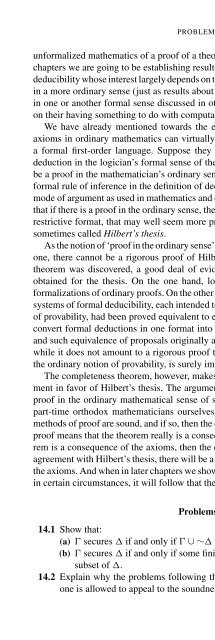Computability and Logic
Computability and Logic
Computability and Logic
Create successful ePaper yourself
Turn your PDF publications into a flip-book with our unique Google optimized e-Paper software.
PROBLEMS 185<br />
unformalized mathematics of a proof of a theorem from a set of axioms. For in later<br />
chapters we are going to be establishing results about the scope <strong>and</strong> limits of formal<br />
deducibility whose interest largely depends on their having something to do with proof<br />
in a more ordinary sense (just as results about the scope <strong>and</strong> limits of computability<br />
in one or another formal sense discussed in other chapters depend for their interest<br />
on their having something to do with computation in a more ordinary sense).<br />
We have already mentioned towards the end of Chapter 10 that theorems <strong>and</strong><br />
axioms in ordinary mathematics can virtually always be expressed as sentences of<br />
a formal first-order language. Suppose they are so expressed. Then if there is a<br />
deduction in the logician’s formal sense of the theorem from the axioms, there will<br />
be a proof in the mathematician’s ordinary sense, because, as indicated earlier, each<br />
formal rule of inference in the definition of deduction corresponds to some ordinary<br />
mode of argument as used in mathematics <strong>and</strong> elsewhere. It is the converse assertion,<br />
that if there is a proof in the ordinary sense, then there will be a deduction in our very<br />
restrictive format, that may well seem more problematic. This converse assertion is<br />
sometimes called Hilbert’s thesis.<br />
As the notion of ‘proof in the ordinary sense’ is an intuitive, not a rigorously defined<br />
one, there cannot be a rigorous proof of Hilbert’s thesis. Before the completeness<br />
theorem was discovered, a good deal of evidence of two kinds had already been<br />
obtained for the thesis. On the one h<strong>and</strong>, logicians produced vast compendia of<br />
formalizations of ordinary proofs. On the other h<strong>and</strong>, various independently proposed<br />
systems of formal deducibility, each intended to capture formally the ordinary notion<br />
of provability, had been proved equivalent to each other by directly showing how to<br />
convert formal deductions in one format into formal deductions in another format;<br />
<strong>and</strong> such equivalence of proposals originally advanced independently of each other,<br />
while it does not amount to a rigorous proof that either has succeeded in capturing<br />
the ordinary notion of provability, is surely important evidence in favor of both.<br />
The completeness theorem, however, makes possible a much more decisive argument<br />
in favor of Hilbert’s thesis. The argument runs as follows. Suppose there is a<br />
proof in the ordinary mathematical sense of some theorem from some axioms. As<br />
part-time orthodox mathematicians ourselves, we presume ordinary mathematical<br />
methods of proof are sound, <strong>and</strong> if so, then the existence of an ordinary mathematical<br />
proof means that the theorem really is a consequence of the axioms. But if the theorem<br />
is a consequence of the axioms, then the completeness theorem tells us that, in<br />
agreement with Hilbert’s thesis, there will be a formal deduction of the theorem from<br />
the axioms. And when in later chapters we show that there can be no formal deduction<br />
in certain circumstances, it will follow that there can be no ordinary proof, either.<br />
Problems<br />
14.1 Show that:<br />
(a) Ɣ secures if <strong>and</strong> only if Ɣ ∪∼ is unsatisfiable.<br />
(b) Ɣ secures if <strong>and</strong> only if some finite subset of Ɣ secures some finite<br />
subset of .<br />
14.2 Explain why the problems following this one become more or less trivial if<br />
one is allowed to appeal to the soundness <strong>and</strong> completeness theorems.


